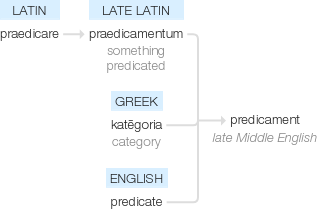Predicament
late Middle English (in predicament (sense 2)): from late Latin praedicamentum ‘something predicated’ (rendering Greek katēgoria ‘category’), from Latin praedicare (see predicate). From the sense ‘category’ arose the sense ‘state of being, condition’; hence ‘unpleasant situation’.
wiktionary
From Old French, from Late Latin praedicamentum(“that which is predicated, a predicament, category, Medieval Latin also a preaching, discourse”), from Latin praedicare(“to declare, proclaim, predicate”); see predicate.
etymonline
predicament (n.)
early 15c., in philosophy, "category, class; one of Aristotle's 10 categories," from Medieval Latin predicamentum, from Late Latin praedicamentum "quality, category, something predicted, that which is asserted," from Latin praedicatus, past participle of praedicare "assert, proclaim, declare publicly," from prae- "forth, before" (see pre-) + dicare "proclaim" (from PIE root *deik- "to show," also "pronounce solemnly," and see diction). Praedicamentum is a loan-translation of Greek kategoria, Aristotle's word.
The meaning "unpleasant, dangerous, or trying situation" is a particular negative use of the general sense of "a state of being, condition, situation" (1580s).
